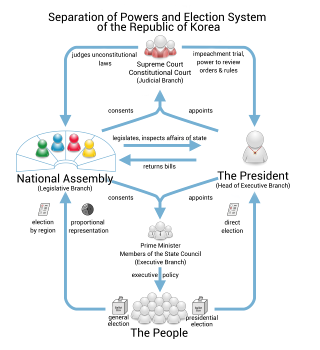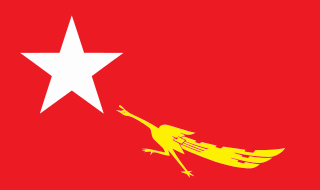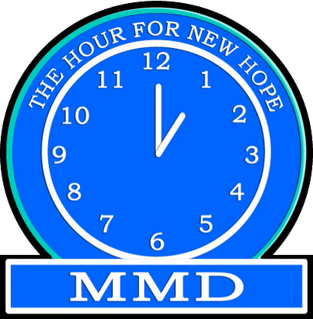
The politics of Brazil take place in a framework of a federal presidential representative democratic republic, whereby the President is both head of state and head of government, and of a multi-party system. The political and administrative organization of Brazil comprises the federal government, the 26 states and a federal district, and the municipalities.
Politics of India works within the framework of the country's Constitution. India is a parliamentary secular democratic republic in which the president of India is the head of state & first citizen of India and the Prime Minister of India is the head of government. It is based on the federal structure of government, although the word is not used in the Constitution itself. India follows the dual polity system, i.e. federal in nature, that consists of the central authority at the centre and states at the periphery. The Constitution defines the organizational powers and limitations of both central and state governments; it is well recognised, fluid and considered supreme, i.e. the laws of the nation must conform to it. India is officially declared a secular and socialist state as per the Constitution.

The politics of Mongolia takes place in a framework of a semi-presidential multi-party representative democracy. Executive power is exercised by the government, which is headed by the prime minister. The president is the head of state, but holds limited authority over the executive branch of the government, unlike full presidential republics like the United States. Legislative power is vested in parliament. The judiciary is independent of the executive and the legislature.

The politics of South Korea take place in the framework of a presidential representative democratic republic, whereby the president is the head of state, and of a multi-party system. To ensure a separation of powers, the Republic of Korea Government is made up of three branches: legislative, executive, and judicial. The government exercises executive power and legislative power is vested in both the government and the National Assembly. The judiciary is independent of the executive and the legislature and comprises a Supreme Court, appellate courts, and a Constitutional Court.
The politics of Tanzania takes place in a framework of a unitary presidential democratic republic, whereby the President of Tanzania is both head of state and head of government, and of a multi-party system. Executive power is exercised by the government. Legislative power is vested in both the government and parliament. The party system is dominated by the Chama Cha Mapinduzi. The Judiciary is independent of the executive and the legislature.

The politics of Zambia takes place in a framework of a presidential representative democratic republic, whereby the president of Zambia is head of state, head of government and leader of a multi-party system. Executive power is exercised by the government, while legislative power is vested in both the government and parliament. Formerly Northern Rhodesia, Zambia became a republic immediately upon attaining independence in October 1964.

The Party of the Democratic Revolution is a state-level social democratic political party in Mexico. The PRD originated from the Democratic Current, a political faction formed in 1986 from the Institutional Revolutionary Party (PRI). The PRD was formed after the contested general election in 1988, which the PRD's immediate predecessor, the National Democratic Front, believed was rigged by the PRI. This sparked a movement away from the PRI's authoritarian rule.

The National League for Democracy is a deregistered liberal democratic political party in Myanmar. It became the country's ruling party after a landslide victory in the 2015 general election but was overthrown in a coup d'état in February 2021 following another landslide election victory in 2020.

The Movement for Multi-party Democracy (MMD) also known as New Hope MMD is a political party in Zambia. Originally formed to oust the previous government, MMD controlled an absolute majority in parliament between 1991 and 2001, when its past leader, Frederick Chiluba was President of Zambia. Its election into power in 1991 ended the 27-year rule of President Kenneth Kaunda and his United National Independence Party (UNIP). It remained the dominant party within Zambian politics until the general elections of September 2011.

The President of the Republic of Zambia is the head of state and head of government of Zambia and is the highest executive authority in the country. The President is elected by popular vote for a five-year term and is responsible for the administration of the government, overseeing the implementation of national policies, and representing Zambia in international affairs. The office was established at Zambia's independence in 1964. The current President is Hakainde Hichilema, who assumed office on August 24, 2021, following the 2021 presidential election where his party, the United Party for National Development, won a majority. The President's role includes appointing the Cabinet, serving as Commander-in-Chief of the Zambian Defence Force, and ensuring the enforcement of laws.
An indirect election or hierarchical voting, is an election in which voters do not choose directly among candidates or parties for an office, but elect people who in turn choose candidates or parties. It is one of the oldest forms of elections and is used by many countries for heads of state, cabinets, heads of government, and/or upper houses. It is also used for some supranational legislatures.

The United Party for National Development (UPND) is a prominent political party in Zambia, founded in December 1998 by Anderson Mazoka, a former executive of the Anglo American Corporation. The party emerged as a significant opposition force following a split from the Movement for Multi-Party Democracy (MMD). The UPND positions itself as a centrist party with strong ideological commitments to social and economic liberalism, advocating for policies that support free-market principles, human rights, and democratic governance.

The Popular Action is a liberal and reformist political party in Peru, founded by former Peruvian president Fernando Belaúnde.

The United National Independence Party (UNIP) is a political party in Zambia. It governed the country from 1964 to 1991 under the socialist presidency of Kenneth Kaunda, and was the sole legal party in the country between 1973 and 1990. On 4 April 2021, Bishop Trevor Mwamba was elected President of UNIP.

The Republic of the Congo elects on the national level a head of state – the president – and a legislature. The president is elected by the people. The Parliament (Parlement) has two chambers. The National Assembly has 153 members, for a five-year term in single-seat constituencies. The Senate (Sénat) has 66 members, elected for a six-year term by district, local and regional councils. The Republic of Congo is a one party dominant state with the Congolese Labour Party in power. Opposition parties are allowed, but are widely considered to have no real chance of gaining power.

The European Social Democratic Party is a centre-left, populist social-democratic political party in Moldova. Established in 1997, the party holds pro-European views, and is an associate member of the Party of European Socialists (PES) and a full member of the Socialist International. According to its statute, the PSDE pleads that Moldova is an independent, sovereign, and democratic state, based on law, and integrated in the united family of European democracies. Reflecting former leader Marian Lupu's views, but also the strong influence of the Moldovan Orthodox Church, the party is more conservative on social issues, such as LGBT rights.

The Legislature of Liberia is the bicameral legislature of the government of Liberia. It consists of a Senate – the upper house, and a House of Representatives – the lower house, modeled after the United States Congress. Sessions are held at the Capitol Building in Monrovia. Legislature of Liberia is considered one of the three branches of government based on the Article III of the Constitution of Liberia that stipulates all three branches ought to be equal and coordinated based on the Principle of checks and balances.

Parliamentary elections were held in Djibouti on 10 January 2003 to elect the National Assembly of Djibouti. The ruling coalition of President Ismail Omar Guelleh won all 65 seats in the election, defeating an opposition coalition.

General elections were held in Myanmar on 8 November 2015, with the National League for Democracy winning a supermajority of seats in the combined national parliament. Voting occurred in all constituencies, excluding seats appointed by the military, to select Members of Assembly to seats in both the upper house and the lower house of the Assembly of the Union, and State and Region Hluttaws. Ethnic Affairs Ministers were also elected by their designated electorates on the same day, although only select ethnic minorities in particular states and regions were entitled to vote for them.

Parliamentary elections were held in Seychelles from 8 to 10 September 2016. Three parties and three independent candidates ran for the 25 directly-elected seats. The result was a victory for the opposition Linyon Demokratik Seselwa alliance, which won 19 of the 33 seats. It was the first time since the 1979 elections that the People's Party did not win a majority of seats.

















